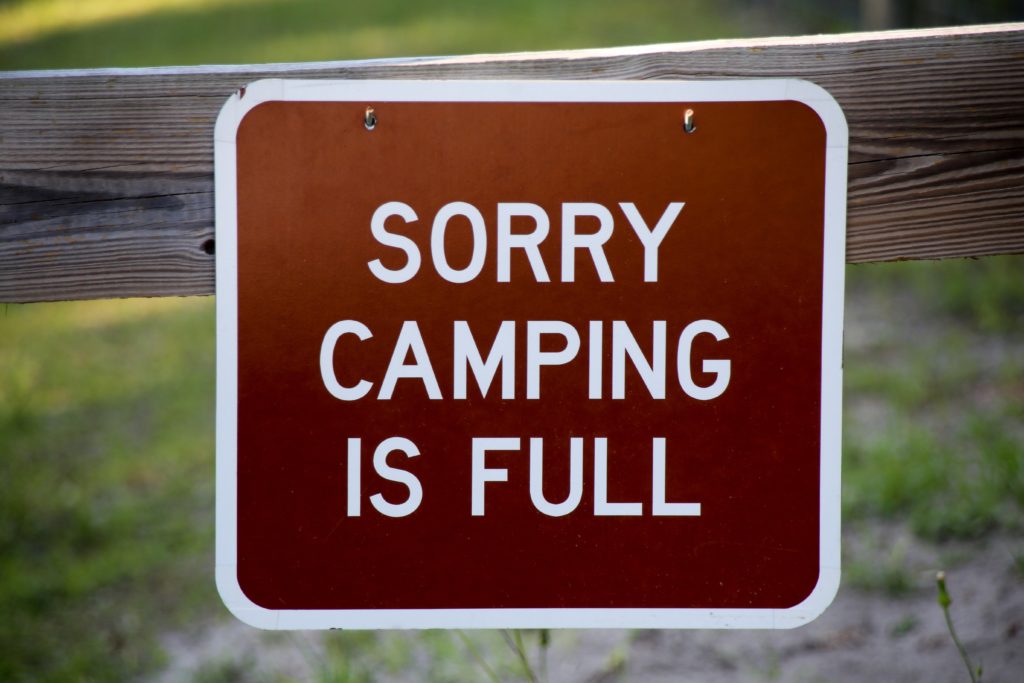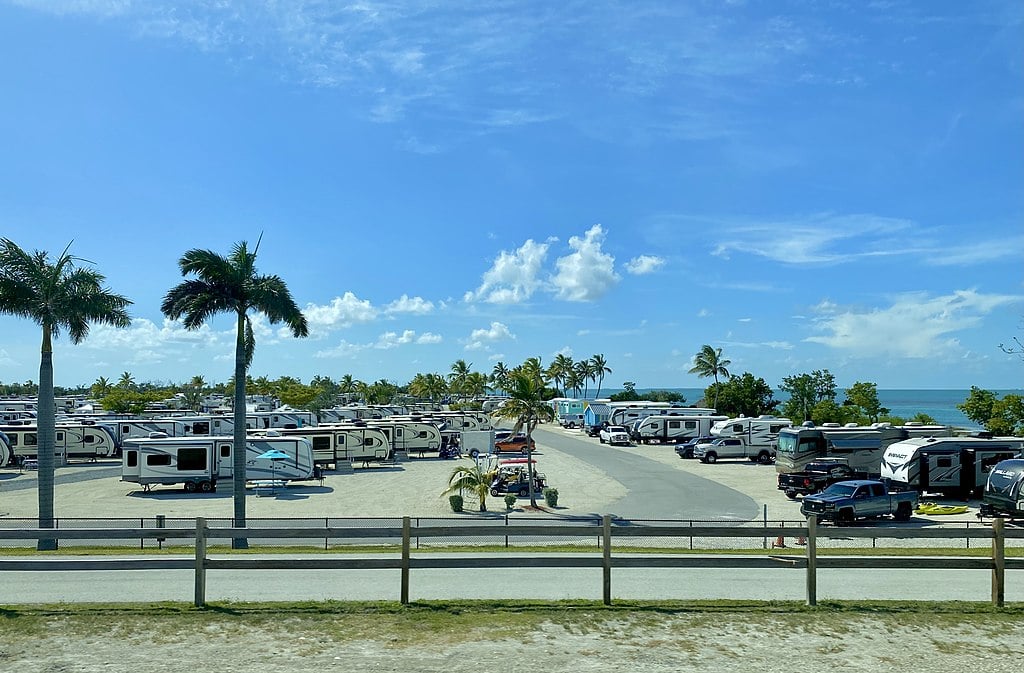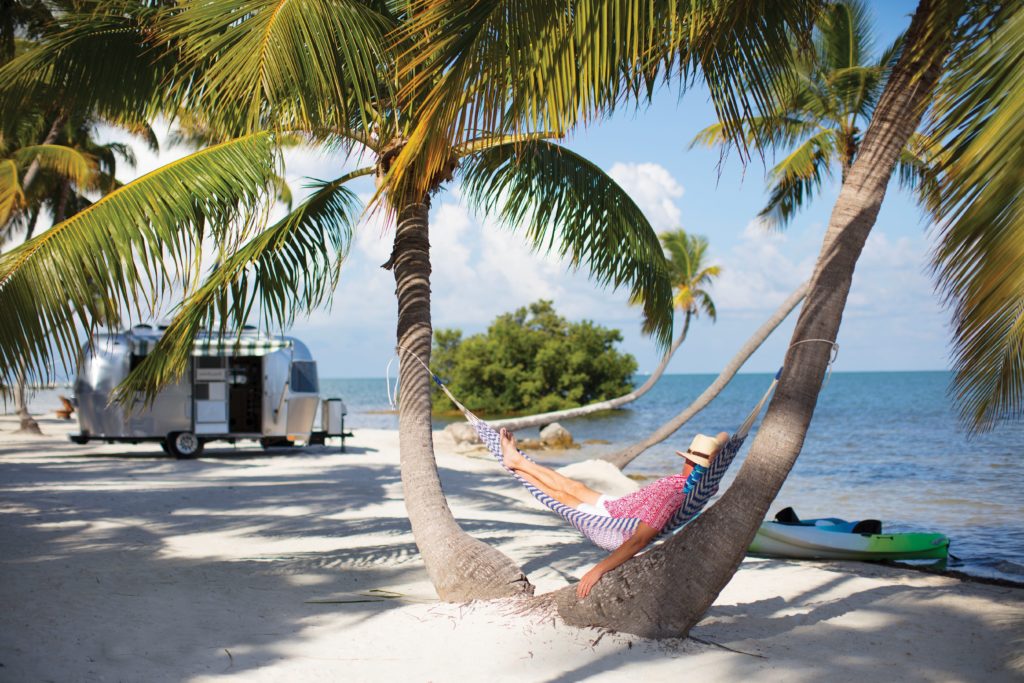Camping in the Florida Keys
Many people dream about camping in the Florida Keys. They imagine white sandy beaches, Caribbean blue water and easy living.
They dream that camping is an easy, cheap alternative to hotels and expensive vacation rentals. Maybe even find some free camping on a beach?
That all sounds great, right?
It does sound great! But, sadly, that fantasy doesn’t exist in real life.
Camping in the Keys is a very different experience than most people imagine. It’s unlike camping anywhere else. In some ways, it doesn’t feel like camping at all.
Camping in the Florida Keys isn’t cheap, and it isn’t that easy.
It’s expensive, and can be very frustrating to arrange. Sometimes it can feel impossible to even find a campsite, because they’re all booked up a year, or more, in advance.
Please understand that none of this is meant to deter you, or be negative. The Keys are beautiful, and are a great adventure in many ways.
Despite all of the challenges and quirks, camping in the Florida Keys can be done, and it can be amazing. If you’re an RVer, a snowbird, or a camping family, the Keys may belong at the top of your camping bucket list.
Still, everyone should know what to expect, because unrealistic expectations lead to disappointment. With realistic expectations, and preparation, camping in the Keys can be an amazing and unforgettable experience.
Campground Expectations
Camping in the Florida Keys doesn’t match most people’s idea about what a camping experience should be.
Many first-time visitors are surprised and disappointed to find that campgrounds in the Keys often feel like expensive parking lots.
Most campgrounds in the Keys have few trees, if any. There is often very little shade, or even grass. Campgrounds and campsites are mostly paved asphalt, concrete, crushed shell or gravel.
In some parks, sites are ridiculously close together. Sometimes you could literally reach out of your window and touch the RV next door. You may hear your neighbors yawn when they wake up in the morning. Or,… other sounds.
Hope that your neighbors don’t stay up all night partying, driving around on golf carts, or have barking dogs.
The uncomfortably close amping is partly driven by profit seeking, and partly because of the realities of living in the Keys. The islands are tiny, and real estate is insanely expensive.
Camping in the Keys isn’t really natural camping, as most people imagine it.
There aren’t many, if any, opportunities to have a campfire in your campsite, or the other basics of camping.
Many campgrounds market themselves as upscale RV resorts. Some don’t have tent camping sites at all. Some RV lots are privately owned by individual owners. Some private RV sites sell for insanely high prices.
I recently looked at one park with multiple RV lots for sale. Many cost over $1 million, and all were in that price range.
RV site ownership is a weird arrangement. It’s sort of like owning a very expensive parking space, as if it’s a condominium.
On top of the purchase price, RV lot owners pay monthly fees for joint upkeep of common facilities, and other shared costs. As with condos, the monthly HOA fees can be very expensive. Property taxes are also assessed on some RV lots.
It is possible to camp in expensive, luxury RV resorts with private ownership. Like condos, many owners of RV sites put them back into the “rental pool” to be rented by the RV park to offset the expensive cost.
Reservations

Campgrounds in the Florida Keys are in extremely high demand.
Especially in the peak winter season, many state parks in the Keys get booked immediately when they become available, eleven months in advance.
People wait for the exact moment campsites become available, and hit the “Reserve” button within seconds of the eleven month booking window.
Private sites are sometimes easier to arrange due to a higher number of sites and RV park options. Still, the best sites in peak season are often reserved for a year or more in advance and it can still be a challenge to find any space at all.
Because camping in the Florida Keys is so difficult to arrange, many RVers choose to stay in hotels, houseboats, tiny houses, AirBnBs, VRBOs and other alternatives, instead.
Honestly, by using basic travel hacking techniques, staying in hotels can often be cheaper than camping in most RV parks in the Keys.
But, still, camping in the Florida Keys is an incredible experience. It offers a totally different lifestyle than staying in a hotel.
Many people love bringing their homes with them when they come to the Keys. It’s all part of the experience.
So, whether you’re tent camping, staying in your own RV, or renting an RV or tiny house, it can be amazing. Just know what to expect, to avoid an expensive disappointment.
Getting to the Florida Keys
Anyone who wants to bring their own RV or travel trailer to the Florida Keys must be willing to accept a big commitment.
It takes a long time to drive to the Florida Keys; it’s a big task in both time and effort.
The Florida mainland peninsula is long and narrow, and can require several days to drive all by itself. Then, the Florida Keys are only accessible via the long chain of bridges and islands, known as the Overseas Highway.
Driving the Overseas Highway is an unforgettable experience. But, it can be challenging. The road is mostly narrow two-lane highway, and often has limited pull-outs.
RVs and travel trailers can be difficult to maneuver through small parking lots and limited pull-off areas.
Large vehicles, including large trucks, should be aware that there are many narrow streets throughout the Keys, especially Key West. Vehicles are often parked on either side of the street, which makes narrow lanes even narrower.
It’s a good idea to avoid taking any large vehicles, RVs or trailers into Key West unless you know where you are going and feel well-informed of the risks.
Unless you’ve been there before and know what to expect, it’s a good idea to plan out rest stops and parking areas ahead of time.
It can be frustrating to drive for miles when you’re ready for a break, but can’t find anywhere large enough to pull off.
Google Maps and Streetview can be a great tool to plan the route and check out possible rest areas and pull offs for big-rigs.
There are boat ramps scattered along the Florida Keys. Some are small, but others offer large parking lots that can accommodate large boat trailers.
Boat ramps and other areas generally cannot be slept in overnight but they can be useful for RVs to take a short break. In all of the Florida Keys, it’s a good idea to always pay close attention to parking restrictions.
After taking a break, RVers should be especially careful when pulling back out onto Highway 1, especially if you must cross lanes of traffic.
Many people drive recklessly on the Overseas Highway; accidents are common. Many tourists are lost, distracted, or aren’t paying attention to the road. Some locals become frustrated by slow-moving traffic and may drive aggressively.
Private vs. Public Campgrounds

Campgrounds in the Keys tend to fall into two categories: public and private. Each has their own advantages and disadvantages.
Private campgrounds are typically very expensive, but the supply of private campgrounds is much higher. They can sometimes offer more activities, amenities and may offer more site variety.
Many private RV resorts and campgrounds have sewer hookups, but all of the state parks in the Keys have dump stations instead of sewer hookups.
State parks offer the most affordable camping prices in the Keys. State parks have fixed rates year-round, and do not inflate their prices during peak tourist season. Campers can stay in campsites for a maximum of 14 days.
State park campgrounds may offer a more pleasant camping experience than many private campgrounds. The sites are often larger, and a greater emphasis is placed on natural beauty, environmental education and conservation.
On the other hand, state parks often have fewer recreational amenities, and the stays are generally limited to a maximum of 14 days.
The worst part about state park campgrounds is that they have extremely limited supply. They are in extremely high demand, so they can be the most difficult campgrounds to reserve.
It is sometimes possible to find last-minute cancellations at state parks in the Keys, but they’re typically only available in one or two-day slots which are difficult to plan a trip around.
The Best Time for Camping in the Florida Keys
The Florida Keys are most crowded in the late winter, especially after Christmas and New Years. That’s when snowbirds flock to Florida to escape cold northern winters.
During this time it can be impossible to find a campground or campsite reservation. The spots are literally booked within seconds after becoming available eleven months in advance.
For travelers with extreme flexibility, it’s often possible to find vacancies due to last-minute cancellations. But, it isn’t feasible to arrange a trip ahead of time based on these unpredictable vacancies.
The least busy times are generally in the hot summer months from mid May until mid to late October, or so.
In late October northern cold fronts begin pushing down into the Keys. The hot, humid air is replaced by cool temperatures and very nice weather.
There can be a bump in visitor traffic around school holidays, especially Thanksgiving and Christmas vacations.
Many people think the best times to camp in the Florida Keys are the “shoulder seasons” in the spring and fall.
- The spring shoulder season is approximately from March to June.
- The fall shoulder season is approximately from November until December.
These time periods are ideal because they have cooler weather and fewer crowds.
Families with children usually cannot travel during shoulder seasons because of the school season, and snowbird season has not yet reached full-swing.
Some events, like spring break in March and holidays like Thanksgiving can be busy, even during the shoulder seasons.
Late fall typically has the best weather, from the last week of September until early December. But, this is also during an active stretch of hurricane season. The good weather and lack of crowds comes with an enhanced risk.
Hurricane Season
Florida’s hurricane season lasts from June 1st through November 30th.
Hurricanes are a massive threat in the Florida Keys. Storms are often devastating for several reasons.
All of the islands in the Keys are tiny, and sit directly at sea level. They don’t have any protection from storm surge or destructive winds.
Many campgrounds in the Keys have been destroyed by hurricanes. Some remain closed for years afterward. Some, like the Sandspur Campground, are still closed to this day, with no plan to reopen.
The most recent devastating hurricane to hit the Florida Keys was Hurricane Irma in 2017.
RVers who bring their own motorhomes or travel trailers should pay close attention to the weather and closely follow guidance from officials. RVers should be ready to evacuate early if there is a legitimate hurricane threat.
Evacuating the Keys is not easy. It’s only possible via the narrow two-land Overseas Highway, which easily becomes choked with traffic and congestion. It can take several days to evacuate to the central mainland of Florida, and even longer to leave the Florida peninsula entirely.
Hotels and campgrounds on the Florida mainland and surrounding states fill up with other evacuees, so it is better to leave earlier rather than later.
Is Camping in the Keys Worth it?
I think it depends. In my opinion, the Keys are definitely worth visiting, but from a camping perspective, it’s a harder question.
I think that the camping options are insanely expensive relative to the value, and the campgrounds aren’t my preferred style, except for the state park options.
I think it would be worth it if you can stay in state parks. Otherwise? I don’t think it’s worth it.
Instead of paying $100+ per night for a crowded parking space, I’d prefer to come and stay in a hotel or vacation rental.
In my opinion there are much better places to camp in Florida. But, many people disagree. Everyone has their own tastes, preferences and opinion!
One thing is for sure, though. Camping in the Keys is much more expensive and difficult than most other places.
It takes a commitment of both time and money. Anyone who’s considering it should be well-informed and prepared, otherwise they may be in for a disappointment.
Feature Image Credit: Sharon Hahn Darlin, CC BY 2.0, via Wikimedia Commons

